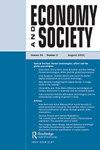The allure of finance: Social impact investing and the challenges of assetization in financialized capitalism
IF 4.3
2区 社会学
Q1 ECONOMICS
引用次数: 2
Abstract
Abstract Scholarship in sociology and political economy is increasingly engaging with assetization: how objects are turned into return-bearing assets. Although assetization rests on power, it cannot be fully explained by it. This paper addresses this puzzle and argues that financial agency involves creating the social conditions for the exercise of financial power. To this end, the paper draws on an in-depth qualitative case study of social impact investing in Britain, where proponents sought to transform the funding of social welfare from nonrepayable grants to for-profit investments. To allure others to assetization, proponents developed a collective action frame to foster collective ignorance over the extractive nature of assetization. Although proponents held important sources of financial power, their success hinged on the credibility and salience of their discursive frame. Financial power thus has a noumenal basis, which is inherently fragile because it rests on deceit.金融的诱惑:社会影响投资和金融化资本主义资产化的挑战
社会学和政治经济学的学术研究越来越多地涉及资产化:对象如何变成有回报的资产。虽然资产化依赖于权力,但不能完全用权力来解释。本文解决了这一困惑,认为金融代理涉及到为金融权力的行使创造社会条件。为此,本文借鉴了英国社会影响投资的深入定性案例研究,其中支持者试图将社会福利的资助从不可偿还的赠款转变为营利性投资。为了吸引其他人参与资产化,支持者制定了一个集体行动框架,以促进对资产化的采掘本质的集体无知。尽管支持者拥有重要的财政权力来源,但他们的成功取决于其话语框架的可信度和突出性。因此,金融权力有一个本质上脆弱的实体基础,因为它建立在欺骗之上。
本文章由计算机程序翻译,如有差异,请以英文原文为准。
求助全文
约1分钟内获得全文
求助全文
来源期刊

Economy and Society
Multiple-
CiteScore
6.30
自引率
5.90%
发文量
23
期刊介绍:
This radical interdisciplinary journal of theory and politics continues to be one of the most exciting and influential resources for scholars in the social sciences worldwide. As one of the field"s leading scholarly refereed journals, Economy and Society plays a key role in promoting new debates and currents of social thought. For 37 years, the journal has explored the social sciences in the broadest interdisciplinary sense, in innovative articles from some of the world"s leading sociologists and anthropologists, political scientists, legal theorists, philosophers, economists and other renowned scholars.
 求助内容:
求助内容: 应助结果提醒方式:
应助结果提醒方式:


